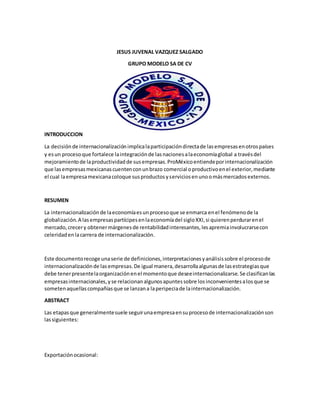
Grupo modelo SA DE CV
- 1. JESUS JUVENAL VAZQUEZ SALGADO GRUPO MODELO SA DE CV INTRODUCCION La decisiónde internacionalizaciónimplicalaparticipacióndirectade lasempresasenotrospaíses y esun procesoque fortalece laintegraciónde lasnacionesalaeconomíaglobal a travésdel mejoramientode laproductividadde susempresas.ProMéxicoentiendeporinternacionalización que lasempresasmexicanascuentenconunbrazo comercial oproductivoenel exterior,mediante el cual laempresamexicanacoloque susproductosyserviciosenunoomásmercadosexternos. RESUMEN La internacionalizaciónde laeconomíaesunprocesoque se enmarca enel fenómenode la globalización.A lasempresaspartícipesenlaeconomíadel sigloXXI,si quierenperdurarenel mercado,crecery obtenermárgenesde rentabilidadinteresantes,lesapremiainvolucrarsecon celeridadenlacarrera de internacionalización. Este documentorecoge unaserie de definiciones,interpretacionesyanálisissobre el procesode internacionalizaciónde lasempresas.De igual manera,desarrollaalgunasde lasestrategiasque debe tenerpresentelaorganizaciónenel momentoque deseeinternacionalizarse.Se clasificanlas empresasinternacionales,yse relacionanalgunosapuntessobre losinconvenientesalosque se sometenaquellascompañíasque se lanzana laperipeciade lainternacionalización. ABSTRACT Las etapasque generalmentesuele seguirunaempresaensuprocesode internacionalizaciónson lassiguientes: Exportaciónocasional:
- 2. Durante estaetapa laempresaexportaa unospocosmercadosutilizandobásicamentela producciónsobrante enel mercadointerior,puesnotiene uncompromisode largoplazoconel mercadointernacional.Normalmenteutilizaintermediarioslocalesparaenviarsusproductosal exterior Exportaciónregular: En estaetapa la empresacuentaconun grupoestable de clientes,suele operarconagentesa comisiónenvariospaíses,onombrar distribuidoresexclusivos.Algunasempresasoptanporcrear un departamentode exportación,abriendo pequeñasoficinasde contactoe informaciónenunoo más países.Estas oficinasconstituyenunmediode comunicación,control yapoyoalos intermediariosenaspectoslogísticos. Existendistintoscanalesde exportación: Exportaciónindirecta:Eslaexportaciónrealizadamedianteintermediariosindependientesque se hacencargo de todoslostrámites.Losdistintostiposde intermediariosson: El compradorextranjero:personaque compraporparte de laempresadel otropaís Comerciante:personaque tomaposesiónde lamercancíay corre el riesgoenla exportación Broker:intermediarioque pone encontactoal vendedorycomprador Agente:personaofirmaque se encarga de ponerlosproductosenel exterior Tradingcompany:empresageneral de comercioque actúaenvariospaíses Consorciode exportación:entidadindependiente propiedadde ungrupode empresas.Las ventajasde este tipode exportaciónsonlamenorinversiónyriesgoylamayor flexibilidad. Los inconvenientessonladependenciatotal de los intermediariosyel menorpotencial de ventas. Exportacióndirecta:La empresaentraencontactocon intermediariosocompradoresfinalesenel otro país y se hace cargo de todoslostrámites.Paraello,tendráque contarcon una infraestructuradestinadaala realizaciónde lamisma,comoexpertosencomercioexterior.Si hace usode intermediarioséstospuedenser Importador:importalosproductospor sucuenta yriesgo Agente:personaofirmalocal que tiene larepresentaciónde laempresaenel país
- 3. Distribuidor:personaque tomaposesiónde losproductosylosvende acambiode un margenal igual que el importador,peroel distribuidorsuele tenerunaexclusividadterritorial yvínculoscon la empresaamás largo plazo Las ventajasde laexportacióndirectasonunmayor potencial de ventasyde beneficiosyun mayor aprendizaje,siendolasdesventajaslainversiónyriesgoylamenorflexibilidad. Establecimientode filialesde venta:Cuandolaempresahaconsolidadounmercadode exportación,debe decidirsi continúavendiendodirectamente desdeel paísde origenyoperando vía intermediariosajenosala empresaobienrealizaunainversiónenrecursoshumanosy financieros.Enestaetapalaempresaasume unaserie de funcionescomercialespreviamente desarrolladasporterceros.Asimismosupone uncambioenlaestrategiainternacional de la empresa,yaque desde laofertade capacidadde producciónse pasaa lacomercialización. Establecimientode subsidiariasde producción:Estaserialaetapaúltimadel procesode internacionalizaciónde unaempresa.Parallegaraestaetapa se suelendarunaserie de circunstanciasprevias: Existe ungran mercadopotencial que puede permitirrecuperar,enunplazorazonable,la inversióneninstalaciones; Existenarancelesotiposde cambiomuyaltos,control de divisasuotras restriccionesque hacen inviable de otromodolaexportaciónaestosmercados El gobiernolocal presionaalas empresasextranjerasolesofrece incentivosparainvertirenel país Los costeslogísticos(fletes) constituyenunaproporcióndemasiadoimportante delpreciofinaldel producto(porla distanciageográficaporel bajovalorintrínsecodel bienexportado),conlocual no compensalaexportacióndel mismoyfinalmente, Existenrecursosproductivos(porejemplobajoscosteslaborales) que hacenrentableparala empresalainversióny,aprovechandoestasventajascomparativas,le permitenobtenerproductos con menorcoste ensu país de origen. La empresaenestaetapaañade nuevasactividadesalasya realizadasenlasfasesmeramente exportadoras.De este modo,lasactividadesproductivasenel extranjerose añadenalas anterioresde marketing,distribuciónyserviciotécnicoestablecidasconlafilial de ventas. LicitacionesInternacionales:LasLicitacionesInternacionalesconstituyenotramanerade internacionalizarlaempresa.Supone laparticipaciónde laempresaenlosconcursospúblicosque se celebrana nivel internacional.Porlotantola empresadebe estarpreparadaparacompetir con empresasde todoel mundo,implica“jugarenlasgrandesligas”.
- 4. Las LicitacionesInternacionalesvandirigidasapequeñasymedianasempresasconpotencial exportadoryque enalgunoscasos ya concursancon las diferentesadministracionesespañolas, en el ámbitonacional,autonómicoolocal ycuya ofertase consideracompetitiva. Las LicitacionesInternacionalespuedensuponerparalaempresalosiguiente: Iniciarse oconsolidarlaactividadexportadora Fomentarel efectoarrastre (alianzasy subcontratación) de empresaseneste entorno. ABSTRACT(ENGLISH) The stepsgenerallytendstofollowacompanyinits internationalizationprocessare asfollows: Occasional export: Duringthisstage the companyexportsafew marketsbasicallyusingthe surplusproductiononthe domesticmarket,ithasno long-termcommitmenttothe international market.Normallyituses local intermediariestosendtheirproductsabroad Regularexport: At thisstage the companyhas a stable customergroup,usuallycommissionagentsoperatein several countries,orappointexclusive distributors.Some companieschoose tocreate anexport department,openingsmall officesandcontactinformationinone ormore countries.These offices are a meansof communication, control andsupportintermediariesinlogistics. There are differentexportchannels:
- 5. indirectexport:exportiscarriedoutthroughindependentintermediarieswhotake care of all the paperwork.The differenttypesof intermediariesare: The foreignbuyer:whopurchase bythe companyof anothercountry Dealer:a personwhotakespossessionof the goodsandrisksinexport Broker:brokerwhocontactedthe sellerandbuyer Agent:personorfirmwho isresponsibleforputtingthe productsabroad Tradingcompany:General tradingcompanyoperatinginseveral countries Exportconsortium:independententityownedbyagroupof companies.The advantagesof this type of exportislessinvestmentandriskandgreaterflexibility. The drawbacksare the total dependence onintermediariesandlowersalespotential. Directexport:Companycontactsintermediariesorendbuyersinanothercountryand takescare of all the paperwork.You'll needtohave aninfrastructure forthe realizationof the same,as expertsinforeigntrade.If youuse these intermediariesmaybe Importer:Importsproductsat yourown risk Agent:personorlocal firmthat is representingthe companyinthe country Distributor:A personwhotakespossessionof the productsandsellstheminexchange fora marginas the importer,butthe dealerusuallyhasa territorial exclusivityandlinkswiththe companylongerterm The advantagesof directexportisa greaterpotential forsalesandprofitsandhigherlearning, withthe disadvantagesinvestmentandriskandlowerflexibility. Establishmentof salessubsidiaries:Whenthe companyhasestablishedanexportmarket,must decide whethertocontinue sellingdirectlyfromthe countryof originandoperatingvia intermediariesoutsidethe companyor makesaninvestmentinhumanandfinancial resources.At thisstage the companytakesa numberof commercial functionspreviouslyperformedbythird parties.Alsoitimpliesachange inthe international strategyof the company,since the supplyof productioncapacityisgoingto marketing. Establishmentof subsidiariesof production:Thiswouldbe the lastof the internationalization processof a companystage.To reach thisstage are oftengivenaseriesof previouscircumstances: There isa large potential marketthatcanallow recover,withinareasonable time,investmentin facilities; There tariffsor veryhighexchange rates,exchangecontrolsorotherrestrictionsthatmake otherwise viable exporttothese markets
- 6. The local governmenthasputpressure onforeigncompaniesorprovidesincentivestoinvestin the country Logisticscosts(freight) constitute toolarge aproportionof the final price of the product (geographical distanceforthe lowintrinsicvalueof the exportedgood),whichdoesnot compensate forthe exportof the same and finally, There productive resources(forexample low laborcosts) thatmake the companyprofitable for investmentandtakingadvantage of these comparative advantages,allow youtoobtainproducts withlowercostin theirhome country. The company at thisstage to add new activitiesalreadycarriedoutinthe exportingmerely phases.Thus,productive activitiesabroadare addedto the above marketing,distributionand technical service establishedwiththe salessubsidiary. International tenders:International Tendersare anotherwaytointernationalizethe company.It involvesthe participationof the companyinpublictendersheldinternationally.Therefore the companymustbe preparedtocompete withcompaniesaroundthe world,involves"playinginthe bigleagues." International Tendersare aimedatsmall andmediumenterpriseswithexportpotential andin some casesalreadycompetingwiththe differentSpanishadministrationsatnational,regional or local level andwhose offeriscompetitive. International Tendersmaypose tothe companythe following: Start or strengthenexportactivity Encourage drag (alliancesandoutsourcing) companiesinthisenvironmenteffect.
- 7. ABSTRACT(GERMAN) Die Schritte derRegel ehereinUnternehmeninseinerInternationalisierungsprozesszufolgen, sindwie folgt: GelegentlicheExport: WährenddieserPhase exportiertdasUnternehmeneinige Märkte imGrunde die überschüssige Produktionauf demInlandsmarktmit,hatsie keinelangfristigesEngagementauf dem internationalenMarkt.Normalerweisenutztsie lokaleIntermediäre ihre Produkte insAuslandzu schicken RegelmäßigeExport: Zu diesemZeitpunkthatdasUnternehmeneine stabile Kundengruppe,inderRegel Kommissionäre arbeiteninmehrerenLändernoderexklusive Distributorenernennen.Einige UnternehmenwähleneineExportabteilung,Öffnungskleine Büroszuschaffenund KontaktinformationenineinemodermehrerenLändern.Diese BürossindeinMittelder Kommunikation,KontrolleundUnterstützungVermittlerinderLogistik. Es gibtverschiedeneExportkanäle:
- 8. indirekte Export:Exportwirddurchunabhängige Vermittler,die kümmernsichumalle Formalitätendurchgeführt.Die verschiedenenArtenvonVermittlernsind: Der ausländische Käufer:die vonderGesellschafteinesanderenLandeserwerben Händler:eine Person,dieinBesitzderWare undRisikenimExportnimmt Makler:Makler,der denVerkäuferkontaktiertundKäufer Agent:PersonoderFirma,die fürdasInverkehrbringenderProdukteimAuslandzuständigist Handelsunternehmen:Allgemeine FirmafürdenHandel inmehrerenLänderntätigsind Export-Konsortium:unabhängige EinheitvoneinerGruppe vonUnternehmengehören.Die Vorteile dieserArtvonExportistwenigerInvestitionenundRisikoundeinehöhere Flexibilität. Die Nachteile sind,dievölligeAbhängigkeitvon VermittlernundniedrigerenUmsatzpotenzial. DirekterExport:UnternehmenskontakteVermittleroderEndabnehmerineinemanderenLand undkümmertsichum alle Formalitäten.Sie erhalteneine Infrastrukturfürdie Realisierungder gleichenhabenmüssen,wieExpertenimAußenhandel.WennSie diese Vermittlernutzenkönnen Importeur:ImportiertProdukteauf eigene Gefahr Agent:Personoderlokale Firma,die dasUnternehmenindemLandvertreten Vertrieb:Eine Person,die inBesitzderProdukteundverkauftsie imAustauschfüreineMarge als Importeurnimmt,aberderHändlerhatin derRegel eine territorialeExklusivitätund VerbindungenmitderGesellschaftlängerfristig Die Vorteile derdirektenExportisteingrößeresPotenzialfürUmsatzundGewinnundhöhere Lernen,mitdemNachteile InvestitionenundRisikoundgeringereFlexibilität. Gründungvon Vertriebsgesellschaften:WenndasUnternehmeneinenExportmarktetablierthat, mussentscheiden,obdirektausdemUrsprungslandunddenBetriebüberVermittler außerhalb desUnternehmensodermachteine InvestitioninpersonellenundfinanziellenRessourcen,um weiterhinzuverkaufen.ZudiesemZeitpunktnimmtdasUnternehmeneine Reihe von kommerziellenFunktionen,die bisherdurchDritte durchgeführtwerden.Auchbedeuteteseine ÄnderunginderinternationalenStrategiedesUnternehmens,dadie Lieferungvon ProduktionskapazitätzuMarketinggeht. Gründungvon TochtergesellschaftenderProduktion:Daswäre die letzte derInternationalisierung einesUnternehmensBühne.Umdiese Stufe erreichen,werdenhäufigeineReihevonbisherigen Umstände gegeben: Es gibteingroßesPotenzial Markt,die sicherholenlassenkann,innerhalbeinerangemessenen Frist,InvestitioneninAnlagen;
- 9. Es Tarife odersehrhohe Wechselkurse,Devisenkontrollenoderandere Einschränkungen,diesonst tragfähige ExportindiesenMärktenmachen Die lokale RegierunghatausländischeUnternehmenunterDrucksetzenoderAnreizeindasLand zu investieren Die Logistikkosten(Fracht) bildeneinenzu großenAnteil desEndpreisesdesProdukts (geographischerEntfernungfürdenniedrigeninnerenWertdesgutenexportiert),dienichtfürdie Ausfuhrderselbenundschließlichnichtkompensiert, Es produktivenRessourcen(zumBeispielniedrigeArbeitskosten),diedasUnternehmen gewinnbringendfürInvestitionenunddie VorteiledieserkomparativenVorteile machen,können Sie Produkte mitniedrigerenKosteninihremHeimatlandzuerhalten. Das UnternehmenindieserPhase neue Aktivitätenhinzufügenbereits indenExportlediglich Phasendurchgeführt.SoimAuslandproduktiveTätigkeitenzudemobenMarketinghinzugefügt, VertriebundtechnischenService eingerichtetmitderVertriebstochter. InternationaleAngebote:Internationale AusschreibungensindeineweitereMöglichkeit,das Unternehmenzuinternationalisieren.Esgehtumdie BeteiligungderUnternehmenan öffentlichenAusschreibungeninternational statt.DahermussdasUnternehmenmitUnternehmen auf derganzenWeltzu konkurrierenvorbereitetwerden, gehtesum"indengroßenLigenzu spielen." InternationaleAusschreibungensindbei kleinenundmittlerenUnternehmenmitExportpotenzial undin einigenFällenbereitsimWettbewerbmitdenverschiedenenspanischenBehördenauf nationaler,regionaleroderlokalerEbene ausgerichtetistunddessenAngebotwettbewerbsfähig ist. InternationaleAngebote könnendiefolgendenfürdasUnternehmendarstellen: StartenoderExporttätigkeitstärken ErmutigenSie ziehen(AllianzenundOutsourcing)Unternehmenin diesemUmfeldWirkung. Fuente https://www.promexico.gob.mx/